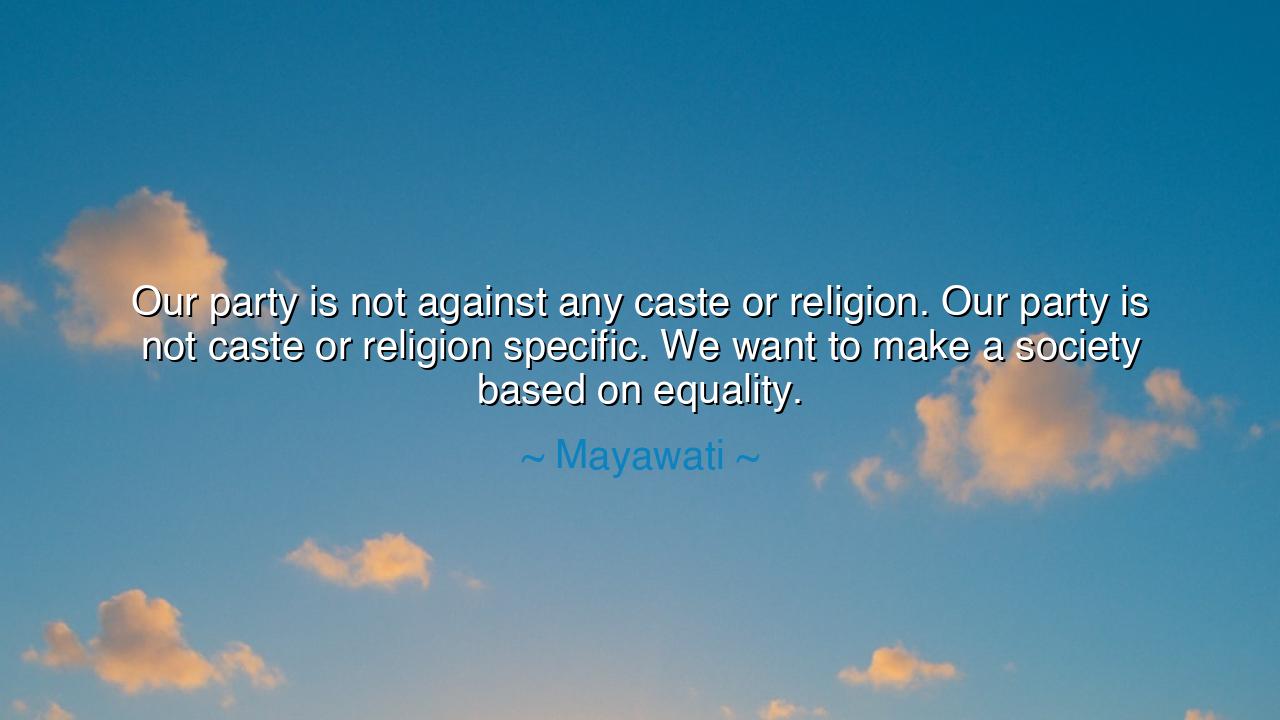
Our party is not against any caste or religion. Our party is not
Our party is not against any caste or religion. Our party is not caste or religion specific. We want to make a society based on equality.






In the vast landscape of human civilization, the struggle for equality has been a theme woven into the fabric of countless generations. Mayawati, the bold leader who has championed the cause of the oppressed, speaks with great clarity and vision when she declares: "Our party is not against any caste or religion. Our party is not caste or religion specific. We want to make a society based on equality." In these words, there is a powerful commitment to the universal ideal of equality—a commitment to transcend the boundaries of caste and religion, and to create a world where the dignity of every individual is honored, regardless of their birth or belief.
The ancient world was no stranger to the divisions that arise from caste and religion. In India, the story of the Bhakti movement echoes through the centuries, as saints like Kabir and Guru Nanak challenged the rigid caste system that sought to divide people based on their social standing. They saw in every human being the spark of divinity, and their message was simple yet profound: equality was the birthright of every soul. They understood that religion and caste should never be barriers to the fulfillment of one's potential or to the recognition of one's humanity. It is in this long tradition of reform that Mayawati stands today, a beacon of hope for those who have long been marginalized and excluded from the corridors of power.
The wisdom of the ancients teaches us that true strength lies not in division, but in unity. Consider the example of the great Emperor Ashoka, whose kingdom stretched across vast lands. Ashoka, after witnessing the devastation of war, turned his heart toward compassion, embracing Buddhism and promoting a society rooted in nonviolence and equality. His vision transcended the divisions of caste, creed, and even ethnicity, as he sought to create a world where all were treated with dignity and respect. In his Edicts, Ashoka called for the equal treatment of all, regardless of their social status or beliefs. His reign is remembered not for the military conquests he achieved, but for the social reforms he implemented, which sought to unite his people in the pursuit of a harmonious society.
Mayawati’s call for a society based on equality is a powerful echo of this ancient wisdom. She seeks not only to challenge the oppressive systems that perpetuate caste and religious divisions, but to forge a new path forward—one where every individual has the right to dignity, opportunity, and justice, regardless of the circumstances of their birth. This is no easy task, for the chains of caste and religion run deep, and the resistance to change is often rooted in centuries of tradition. Yet, as history has shown us time and time again, the forces of equality and justice are unstoppable when they are fueled by the collective will of the people.
It is important to remember that Mayawati’s words are not just political rhetoric—they are a call to arms in the battle for social justice. The struggle she speaks of is not merely about policies and laws; it is about the very soul of society. In a world that so often seeks to divide, to segregate, and to discriminate, the true power of unity lies in our ability to see beyond the superficial markers of caste and religion and to recognize the shared humanity that unites us all. The teachings of the ancients remind us that only when we transcend these divisions can we hope to achieve true peace and prosperity for all.
The lesson we learn from Mayawati’s vision is clear: equality is not a privilege to be granted to a few, but a fundamental right that must be fought for by all. Just as Ashoka sought to bring his people together under the banner of compassion and nonviolence, so too must we strive to create a world where every person is valued and respected, regardless of their background. This is the task of the wise—to build societies that do not distinguish between people based on their caste, religion, or any other artificial construct, but that recognize the inherent dignity of every human being.
In our own lives, let us be inspired by Mayawati’s words to embrace the ideals of equality and unity. Let us work towards a society where differences are celebrated, not feared, and where every person has the opportunity to flourish. Let us actively challenge the systems of oppression that seek to divide us, whether they are based on caste, religion, or any other form of discrimination. By doing so, we honor the legacy of the ancients, and we pave the way for a future where the human spirit can truly thrive in freedom and equality.






AAdministratorAdministrator
Welcome, honored guests. Please leave a comment, we will respond soon